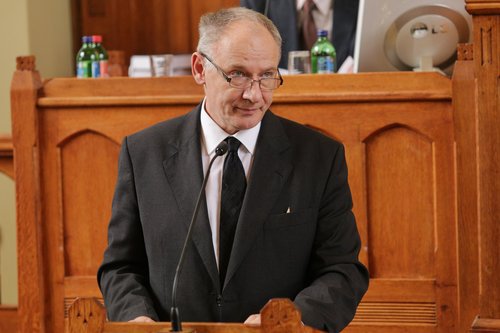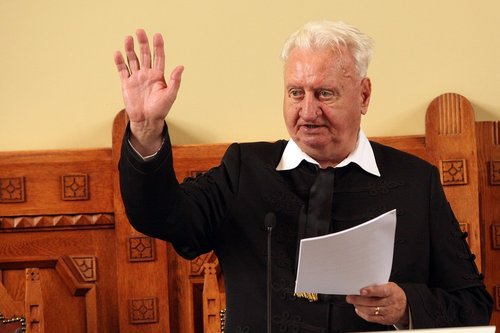At its constituting meeting on 25th February the new General Synod elected its ministerial and lay Presidents for the coming 6 years. The outgoing Presiding Bishop Gusztáv Bölcskei has been succeeded by Dr. István Szabó. The number of women has tripled in the new Synod.
The election of the new Presidency of RCH brought a long election period of more than one year to an end which took place on all levels of church life, except the congregations. On Presbytery level 27 deans and chief elders (lay presidents), and hundreds of regional Council members were elected, along the leaderships and council members (regional Synods) of the 4 church districts, in the last several months.
The Presbytery Councils (Assemblies) summoned the officers to be installed by 31st December 2014. The same procedure took place in Church District level until 31st January 2015. The outgoing bodies and officers remained in office as interim officers until the new officers were installed and take up their new offices and new bodies constituted and began their work after 1st January 2015.
After 18 years in the Office, Gusztáv Bölcskei retires as Presiding Bishop of RCH and continues his service as Rector of the Reformed Theological University in Debrecen.
His successor István Szabó was elected out of the four Bishops of the four Church Districts of RCH, themselves recently elected and inducted in their offices. Bishop Szabó was voted by 55 of the 100 members of the Synod. Pál Huszár has been re-elected as Lay President.

Dr. István Szabó is Bishop of the Danubian Church District based in Budapest.
István Szabó was born in 1956 in Sárbogárd, in a pastor family with seven children. He is married, has three children and one grandchild. Rev. Bogárdi has been serving as the pastor of the Budahegyvidék Congregation since 1997. He received his master’s degree in 1983 in Chicago and his doctorate degree in 1994. He has been teaching theology in the Theological Academy in Pápa since 1998 and received habitation in 2002. He participated at several ecumenical discussions within WCRC and CEC CiD. He is member of the Collegium Doctororum and the Commission for Formation of Pastors in Hungary and appointed for Ecumenical Dialogue with the Roman Catholic Church. His special fields of research are the history of symbols and confessions of the different denominations and their Comparative study. Since 2003 he has been serving as a Bishop at the Danubian Reformed Church District and has been re-elected twice.

Dr Pál Huszár is Lay president of the Transdanubian Reformed Church District based in Pápa.
Pál Huszár was born in 1941 in Várpalota as the fifth child of the family. He studied Pedagogy at Eötvös Lóránd University (ELTE) and worked as a secondary school teacher for twenty-eight years. He has been the elder of the Reformed Congregation of Várpalota for twenty years. He translated several books from German for the John Calvin Publishing House. In 2008 he was elected as the Lay President of the Transdanubian Reformed Church District. He wrote a book about the life of John Calvin and the Life of Reformers for the announcement of the Calvin Memorial Commission in 2009.
The Bishop of the Transcibiscan Reformed Church District (Debrecen) Bishop Dr. Károly Fekete is the Vice Ministerial President of the RCH of the, while the Lay President of the Cistibiscan Reformed Church District (Miskolc) Tibor Ábrám is the Vice Lay President.
The Presidium represents the RCH in the coming 6 year period on national and international level. They convene and preside together the meetings of the General Synod which take place two times a year.
There are not only new leaders of the synod, but the highest legislative and governing (decision making) body of RCH itself is newly constituted for the upcoming 6 year term. The Synod has a balanced membership according to the reformed tradition of double representation. The Synod has 100 members, 30 are ex officio members, 70 are elected directly by congregations and the regional synods of church districts. Half of the members are lay and half of them are ordained Ministers. The number of women in the new Synod has not only increased, but tripled. Instead of 2 the Synod now counts 6 women within its members. The membership is now younger - with 60% of the members being in their 50s, while the other 40% being under 40 or over 60 years of age. The average age is 55.
Read more about the election process and get to know the Presidiums (Bishops and Lay Presidents) of the Church Districts.
When we go into the circus - Read the Interview with Bishop Szabó about Church, democracy and politics by Zsuzsa Fekete
Contact details of the RCH Presidium
Reformed Church in Hungary
H-1146 Budapest, Abonyi 21.
PO Box: 1440 Budapest, 70. Pf. 5.
E-mail address of the Ecumenical Office: oikumene@reformatus.hu